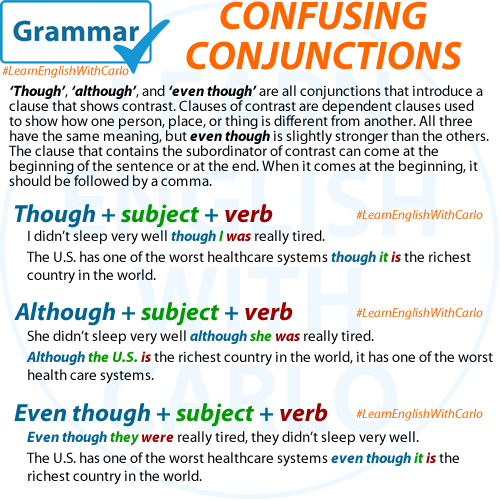Though, Although, and Even Though
Conjunctions play a crucial role in connecting ideas within sentences, and when it comes to expressing contrast, three common ones stand out: “though,” “although,” and “even though.” Let’s delve deeper into how these conjunctions function and how they can elevate your writing!
1. Though
- Usage: “Though” introduces a clause that presents a contrast to the main idea of the sentence.
- Example: “I didn’t sleep very well though I was really tired.”
- Explanation: Here, “though” sets up a contrast between the speaker being tired and not sleeping well.
2. Although
- Usage: Similar to “though,” “although” also introduces a contrasting clause.
- Example: “She didn’t sleep very well although she was really tired.”
- Explanation: Despite being tired, the subject experiences difficulty sleeping, highlighting the contrast.
3. Even Though
- Usage: “Even though” intensifies the contrast and emphasizes the unexpectedness of the outcome.
- Example: “Even though they were really tired, they didn’t sleep very well.”
- Explanation: This construction underscores the surprising fact that despite extreme tiredness, the subjects still struggle to sleep.
Placement of Contrasting Clauses:
- These contrasting clauses can be positioned either at the beginning or end of a sentence.
- When at the beginning: Remember to use a comma after the clause.
- Example: “Though it is the richest country in the world, the U.S. has one of the worst healthcare systems.”
- When at the end: No additional punctuation is needed.
- Example: “The U.S. has one of the worst healthcare systems even though it is the richest country in the world.”
Understanding the nuances of these conjunctions empowers you to express contrasting ideas effectively in your writing. Practice using them to add depth and clarity to your sentences!
Tip: Experiment with different placements and conjunctions to find the most impactful way to convey contrast in your writing.

